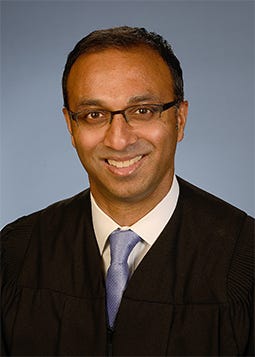U.S. Judge Amit Mehta Rules Google Is A Monopolist
Why AI platforms may obsolete the online search battle between Google, run by Sundar Pichai, and Microsoft, run by Satya Nadella
(Photo: Sundar Pichai, CEO, Google.)
August 5, 2024
Judge Amit P. Mehta ruled today that “Google is a monopolist, and it has acted as one to maintain its monopoly.” Mehta, 52, is a judge for the United States District Court for the District of Columbia in Washington DC.
Google, whose parent is Alphabet, has violated the anti-trust Sherman Act “by maintaining its monopoly in two product markets in the United States—general search services and general text advertising-through its exclusive distribution agreements.” Mehta stated in his 276-page judgement.
The case against Google was filed in 2020 by the U.S. Department of Justice, under President Donald Trump, along with attorney generals from 38 states and territories.
Google parent Alphabet has a market value of roughly $2 trillion. “Much of that value is due to Google's extremely profitable advertising business” noted Mehta.
In 2009, 80% of online search in the U.S. went through Google. By 2020, Google had nearly 90% of the search traffic and roughly 95% of mobile search. In 2014, Google booked $47 billion in U.S. online advertising revenue. By 2021, this revenue rose more than three-fold to over $146 billion. By comparison, in 2022, revenues of Bing, rival Microsoft’s search engine, totaled less than a tenth at about $12 billion.
Google has the highest quality search engine trusted by hundreds of millions of users daily, Mehta’s ruling states. This was achieved “by hiring thousands of highly skilled engineers” and innovating consistently. But its dominance in the search market, he adds, is due to “a major, largely unseen advantage over its rivals: default distribution. Most users access a general search engine through a browser (like Apple's Safari) or a search widget that comes preloaded on a mobile device. Those search access points are preset with a ‘default’ search engine. The default is extremely valuable real estate. Because many users simply stick to searching with the default, Google receives billions of queries every day through those access points. Google derives extraordinary volumes of user data from such searches. It then uses that information to improve search quality. Google so values such data that, absent a user-initiated change, it stores 18 months-worth of a user's search history and activity.”
In return, Google’s partners like Apple, Samsung, and others, earn a revenue share. “In 2021, those payments totaled more than $26 billion. That is nearly four times more than all of Google's other search-specific costs combined,” Mehta’s ruling notes.
(Photo: Judge Amit P. Mehta.)
Amit P. Mehta was appointed to the U.S. District of Columbia court in 2014, during Barack Obama’s administration. Earlier, from 2007 - and previously from 1999 to 2002 - he was at Zuckerman Spaeder, a law firm in Washington DC, with a practice focused on white-collar criminal defense, business disputes, and appellate advocacy.
In 2002, Mehta worked as a staff attorney at the District of Columbia Public Defender Service. He clerked for Judge Susan P. Graber of the United States Court of Appeals for the Ninth Circuit.
Mehta served on the Board of Directors of the Mid-Atlantic Innocence Project and is the former co-chair of the District of Columbia Bar’s Criminal Law and Individual Rights Section Steering Committee. He is also a former Director of Facilitating Leadership in Youth, a non-profit organization dedicated to after-school activities and mentoring for at-risk youth.
Mehta received his B.A. in Political Science and Economics from Georgetown University in 1993 and his J.D. from the University of Virginia School of Law in 1997. He was born in Patan, India, migrating to the U.S. with his family when he was 1 year old. He grew up in suburban Baltimore where his father, Priyavadan Mehta, was an engineer; and his mother, Ragini Mehta, a laboratory technician.
Google said it plans to appeal the ruling, which means a resolution, either as an agreement or a final judgement, could be years away. It is likely that, by the time a final decision is made in the case, the online search business, including winners snd losers, will have been entirely transformed by new artificial intelligence tools.
Among the key witnesses for the plaintiffs against Google were executives from Microsoft, including chief executive Satya Nadella. Since late 2022, both Nadella, 56, and Sundar Pichai, 52, chief executive of Google and Alphabet, are aggressively marketing competing AI-powered search tools. Bing is relying on Open AI’s Chat GPT as well as AI tools from Microsoft and others. Similarly, the top result in most Google searches, AI Overviews, is powered by Google’s AI tools, even as this likely hurts its search advertising revenues.
In addition, there are new AI powered search engines being built from scratch. They include Search GPT from Open AI, whose AI tools provide answers from the content of publisher partners, including News Corp., owner of the Wall Street Journal and Fox News. Open AI, which is building Chat GPT, Dall-E and other AI tools, has raised $13 billion from Microsoft and is valued at $80 billion, according to The New York Times.
Another answer engine is offered by Perplexity.AI, which has raised $137 million so far this year. It reportedly is in the process of raising an additional $250 million at a valuation of $3 billion, according to Reuters.
Perplexity could build a $1 billion annual revenue business if it attracts five million paying customers, about two percent of Google’s 276 million monthly active users in the U.S. Srinivas told decrypt.co, “I'm happy with just executing on the boring task of being the most accurate answer engine in the world.”



